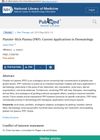Allohernioplasty With the Introduction of Platelet-Rich Plasma in a Chronic Experiment: Features of the Reparative Process
May 2025
in “
Ambulatornaya khirurgiya = Ambulatory Surgery (Russia)
”

TLDR Optimal PRP dosage improves healing and reduces complications in hernia repair.
The study investigated the effects of platelet-rich plasma (PRP) on the reparative process in allohernioplasty using 47 Wistar rats. The rats were divided into three groups: optimal PRP dosage, maximum PRP dosage, and no PRP. Results showed that the optimal PRP dosage improved mesh implant integration, prevented rough fibrosis, and reduced the likelihood of chronic pain syndrome. Morphological analysis revealed better vascularization, early formation of a delicate scar, and minimal nerve degeneration. However, excessive PRP dosage led to destructive-inflammatory reactions and chronic abscesses due to excessive neutrophil and macrophage activity.


